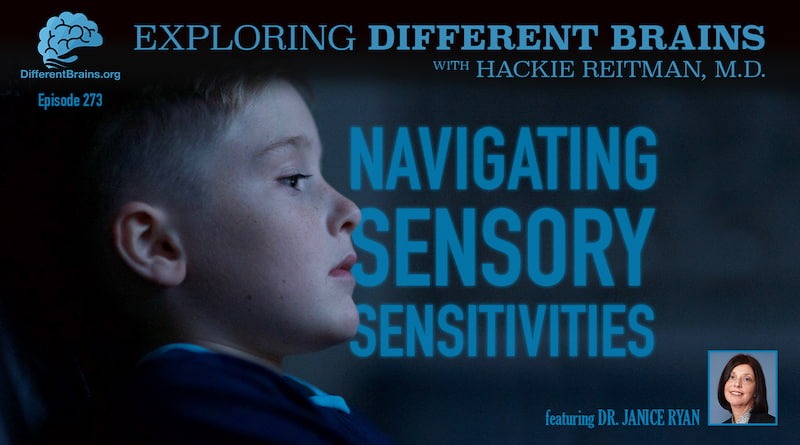Demystifying Tourette Syndrome, with Tara Lerman | EDB 263

Journalist & self-advocate Tara Lerman shares the realities of Tourette Syndrome.
(VIDEO – 14 mins) Tara Lerman is a neurodivergent writer and editor with a demonstrated history of working in news media and branded content. Diagnosed with a tic disorder at the age of nine, she is focused on bringing her own experience with Tourette’s syndrome to the conversation around neurodiversity at work. She is currently the deputy editor of branded content at GovExec, a D.C.-based news and information services company, where she also serves on the diversity, equity and inclusion (DEI) council. When she’s not working or writing about neurodiversity, you can usually find Tara hiking, biking or rock climbing.
For more about Tara: https://www.taralerman.com/
AUDIO PODCAST VERSION:
Or look for us on your favorite podcast provider:
iTunes | Stitcher | SoundCloud
FULL TRANSCRIPTION
HACKIE REITMAN MD (HR):
Hi, I’m Dr. Hackie Reitman. Welcome to another episode of Exploring Different Brains. And today I’m excited to welcome to our show here. Tara Lerman. Tara is a writer and author, a journalist and a Tourette’s self advocate. Welcome, Tara.
TARA LERMAN (TL):
Thanks, Hackie. Thanks so much for having me.
HR:
Thanks for being here. Could you introduce yourself a bit more properly than I did?
TL:
Yeah, absolutely. So yeah, so my name is Tara Lerman. I’m a neurodivergent, writer and journalist based in DC. So right now, I’m the deputy editor of content at a media and information services company called GovExec. So I have the pleasure of working with really interesting clients telling their stories in compelling ways. So that’s everything from podcast production, video scripting, interviewing, kind of like you’re doing with me right now. And no two days are the same, which is great for me because I I’m really someone who gets a bit restless and gets bored pretty easily. So I’m, you know, I love kind of getting to talk to different people and doing different things. And, you know, there’s there’s this big movement around neurodiversity at work right now. And I’ve only started to come to terms with my own neurodiversity fairly recently. You know, I have a tic disorder, called Tourette’s. And, you know, I was diagnosed when I was in third grade, but really, for a long time, kept it to myself and to my, you know, close friends and family. But, you know, the older I got, the more I realized this is, you know, a big part of who I am. And you know, there’s good things about it. There’s bad things about it, but really being authentic and talking about it and sharing my story. And kind of getting behind some of the stigmas around it. It’s kind of what I’m trying to do now.
HR:
So for those of us who don’t know, or have the wrong idea of what Tourette syndrome is, why don’t you explain it to us?
TL:
Yeah, absolutely. So, Tourette’s is a neurological condition. It causes people to have tics, so sudden twitches, movements or sounds that people do repeatedly. You know, my, my condition of Tourette’s is different than, you know, someone else’s condition. Some are more more intense, you know, some are a little bit more mild. We can you know, what people who have Tourette’s generally can hide them. But um, you know, when, when I’m hiding my tics, it’s not comfortable. It’s like, takes a lot of social anxiety. And so I guess, I think one of the biggest misconceptions around Tourette’s is that it’s, you know, swearing, it’s, you know, and I think that’s, that’s a term called coprolalia. And that’s actually only 10% of the people who have Tourette’s have carpal laelia. I’m not one of them. There are people who have it. But I think that’s kind of like, the the general…
HR:
That’s how we see it portrayed in the media. The cursing and bad words and everything. But that’s only 10% of those who have Tourette’s. Tell us about growing up with your tics and figuring things out.
TL:
Yeah, yeah. So it’s interesting, I think a lot of people have kind of good memories of their childhood. And there were definitely some good memories. But I would say generally, it was a really hard time in my life. You know, obviously, I was in third grade, I was bullied in school for my text takes quite a bit. I even once got kicked out of class from, you know, for being loud in class or kind of misbehaving, when really, I was just, you know, making sounds that I couldn’t control. And so a lot of my teachers didn’t really know how to deal with the situation, they weren’t really trained on it. And, you know, because of those experiences, I had a lot of shame around it. And that’s part of the reason I held it in for so long. And I didn’t tell people about it. But, you know, in high school and college, I got a little bit more comfortable. I told some of my close friends, but I’m still pretty closed off about it. And yeah, I think, you know, just having those experiences and, you know, I, I almost associated my Tourette’s with this, this view of myself from from the outside, you know, people, I would always think like, oh, you know, I’m, I’m, you know, different and I’m, you know, people won’t like me, or people will judge me because of my tics. And, you know, the more I’ve opened up about it, the more I realized that’s not the case at all, and everyone’s really understanding. You know, not everyone of course, there are people who aren’t but in general, in general, my good friends, my colleagues, they’ve all been really understanding about it and open to talking about it and you know, asking how they can help you and stuff.,
HR:
Have you tics changed over time. Yeah,
TL:
Um, so I’ve had it’s interesting, I have one tic, where like, I kind of, like, like, Oh, like that, um, that’s probably like that’s kind of lasted throughout my entire life. But then I have other ones that you know, ebb and flow kind of, you know, I’ll have one where like, like a neck tic. You know, that’s kind of like the only kind of noise that I make. But um, yeah, yeah, I would say they kind of come and go. So it’s, it’s, it’s interesting, like, yeah, and then there are ones that I had when I was younger that I don’t have anymore. I think sometimes people their takes get less severe as they got older. And I would say in college, my export list of years, but now, you know, they’ve come back. And I think also just me embracing them has made me a little bit more comfortable just, you know, not hiding and as much.
HR:
Does stress play a role with the pronouncing the tics.
TL:
Yeah, I would say when I’m tired, stressed. I definitely tic more. If I’m in like an uncomfortable situation, if I put held them in all day, if I’ve been in like a group setting, and I, you know, I’m not ticing as much and then I come home, and I find myself and I, I take a little bit more. So there’s a lot of different factors that play a role for sure.
HR:
For some of our viewers out there who might have Tourette’s and might have be having trouble at work. Tell us about the workplace and how you navigate the workplace.
TL:
Yeah, so um, I would say I, you know, it’s interesting, it’s, every, I’m still working remote, because COVID. And one thing I noticed is like, being on Zoom and ticing, it’s interesting, because if you’re not on mute, you’ll, you know, I’ll do one of my tics, and it’ll think I’m talking and it’s this kind of weird thing. So it’s almost more noticeable, because I’m remote. And so I actually did have a conversation with my boss around it. She was super supportive. And, you know, this was not when I started, it was kind of further along, it was kind of like, I was like, I know, she knows that there’s something and I’m not talking about it, and she’s not going to ask me about it. So I really need to, you know, be open about it. And so I talked her about it, she was actually really understanding she even told me about, you know, she, she has ADHD. And, you know, it’s not something that I don’t I don’t know if she would have told me if I didn’t kind of open up to her first. And then you know, I’m also on a diversity, equity and inclusion council at my own company. And so obviously, we talk about race, we talk about gender, we talk about socio economic status, all these things, but um, you know, neuro diversity is something that I think sometimes it’s forgotten and even within the neurodiversity conversation, Tourette’s is like, you know, kind of people don’t think about it, they think of okay, autism, ADHD. So I think it’s kind of like raising awareness around that and talking about, you know, your diversity and disability inclusion, all that stuff.
HR:
Yeah it’s funny how in the universe of neurodiversity, like Tourette’s has become kind of a stepchild, you know,
TL:
Yeah, yeah, totally. Like, yeah, it’s like, what, you know, when you know, when you mentioned it, it’s people are like, oh, yeah, of course, that’s part of neurodiversity. But yeah, it’s it’s definitely a kind of, I don’t know, not to say there are levels of it, but it’s definitely forgotten about sometimes.
HR:
Tell us about your work and how you got into it?
TL:
Yeah, yeah, absolutely. So, um, you know, I think because of, not because of my Tourette’s, but certainly an aspect of it as a kid, you know, I was bullied a lot. Like I said, I didn’t really do super well, in school, I, you know, I worked really hard. And I, I, there were certain things that, you know, I needed extra time on tests and stuff like that. But one thing I was always really good at, was writing. And, you know, I always wanted to get into journalism, I studied English when I went to college. And really, you know, my first job out of college was, was working with a, at a at a firm that kind of did government, government services. And I really liked the idea of just working with government leaders and, you know, telling their stories, and really the mission behind it. And so what I do now is a little bit more creative, but it’s still kind of working with that, you know, that industry, which which I enjoy.
HR:
From your perspective, what role do you think journalism can play in, you know, bringing society more to its senses about its approach to neurodiversity?
TL:
Yeah, so I think, you know, there’s obviously this huge movement in the workforce, specifically around diversity, equity and inclusion. But I think just, you know, telling the stories of of the neurodiverse community, there’s so many people who fall under that umbrella. And, you know, I think I think a lot of a lot of us, myself included for a while, it just haven’t been willing to admit that. But, you know, the more the more we make it more, you know, mainstream and more, really, we talk about it more, the better. I think, you know, people are gonna really make changes in the workplace and make changes in society. And I think, you know, journalists just the way they tell her stories, you know, not stigmatizing us not, you know, getting getting the facts right about about Tourette’s and about, you know, other other kind of misconceptions around different disabilities as well.
HR:
What kind of specialists do you go to, when you discover you have Tourette’s?
TL:
Yeah, so I went to, you know, when I was younger, I saw a psychologist. And I saw a psychiatrist as well. There’s also people who go to a neurologist, I actually go to a neurologist, but not for my Tourette’s, I have migraines as well. And, you know, that’s kind of anxiety induced. So there’s a lot of comorbidities around, you know, I also had OCD as a kid. pretty severe. It’s, you know, I still have it, but it’s a little bit less severe now. So yeah, there’s there’s kind of a lot of different ways to go about it. But I would say neurologist and psychiatrist are kind of the two main ones.
HR:
Yeah. And that’s one of the reasons we started different brains.org is because none of these entities occur in isolation. There’s always overlap and comorbidities. And it’s not, it’s not isolated. Yeah, yeah, for sure. What is one thing you wished everyone knew about Tourette syndrome and other tic disorders?
TL:
Yeah, that’s a great question. I would say, I, I wish people knew that, you know, not everyone with Tourette’s is what you see in the media, what you see kind of on TV, I think there’s a lot of jokes around it. But you know, to those of us who have it, it’s, you know, it can be funny when we’re when we’re making fun of ourselves, but it’s not, you know, it’s not something to laugh at, in it. It is a serious condition. Some people have kind of different tics, more severe tics, some people have less severe tics, you know, there’s no one size fits all. So, you know, you might have a friend with Tourette’s, but that’s, you know, you might need another person who doesn’t have Tourette. So, you know, really just knowing that it’s a complex disorder, but also, you know, it can give, give people who have it really interesting kind of attributes as well, I would say, I’m more creative because of it, I have more empathy because of it. So you know, as many frustrations as there are, there’s also kind of little, you know, really good things about it, too.
HR:
How do people find out more about your work?
Yeah, so I have a website, it’s just TaraLerman.com, so my name and then add a .com, um, you know, that’s where I, you know, I put a lot of my, my work, and then as well as my, you know, my writing around Tourette’s and some of the other stuff that I’m doing. So that’s where you can find all my stuff.
HR:
That’s a good website. When has your name.
TL:
Good thing about having a not so common name.
HR:
Is there anything we have not covered today that you’d like to cover?
TL:
Um, I don’t think so. I think I would just say, you know, to people who see someone who’s moving a little bit differently, or, you know, maybe has has kind of a tic or Twitch, just, you know, giving them grace not staring. I think that’s kind of one of the biggest things that I deal with, it’s not necessarily the Tourette’s itself, although that can be frustrating. It’s, it’s really the, you know, the way that people look at me when I when I am taking in public and stuff like that. And so I think just, you know, going about your day with a bit more empathy and really understanding that, you know, we’re all dealing with something. And what that is, you know, might not be entirely clear, but yeah, just just kind of being being a little bit less judgmental.
HR:
Right. Well, Tara Lerman, thank you so much for being with us today, teaching us all about Tourette’s coming to us all the way from Washington, DC. And we hope you won’t be a stranger here at Different Brains and we can have you back.
TL:
Of course. Thanks so much for talking with me, I appreciate it.




